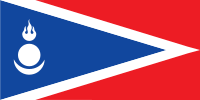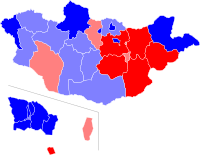Democratic Party (Mongolia)
Democratic Party Ардчилсан Нам | |
|---|---|
 | |
| Abbreviation | DP (English) АН (Mongolian) |
| Presidium | National Policy Committee |
| Party Leader | Erdene Sodnomzundui |
| Vice chairperson | Rinchinnyamyn Amarjargal Tsevegdorjiin Tuvaan Batbayaryn Jargalan |
| General secretary | Tsendiin Baatarkhüü |
| Founded | 1990 6 December 2000 (officially) |
| Headquarters | Ulaanbaatar, Mongolia |
| Newspaper | Ardchilal Times |
| Student wing | Democratic Student's Union |
| Youth wing | Democratic Youth Union |
| Women's wing | Democratic Women's Union |
| Membership | 150,000[1] |
| Ideology | Mongolian nationalism[2] Economic liberalism[3] Liberal conservatism[4] |
| Political position | Centre-right |
| International affiliation | International Democrat Union |
| Colors | Blue |
| State Great Khural | 11 / 76 |
| Party flag | |
 | |
| Website | |
| www.democrats.mn | |
The Democratic Party (Mongolian: Ардчилсан Нам, Ardchilsan Nam) is a centre-right political party in Mongolia.
History[]
This section needs expansion. You can help by . (June 2020) |
After the 1990 democratic revolution,[5] Mongolia became a country with a multi-party system. The democratic revolution transformed Mongolia from a single party communist state into a dynamic democracy. Those who pioneered the democratic revolution established political parties such as the Mongolian National Progress Party and Mongolian Social Democratic Party during the Democratic Revolution. On 6 December 2000, five political parties – including the Mongolian National Democratic Party, Mongolian Social Democratic Party and others merged and established the Democratic Party of Mongolia.
Personnel[]
This section needs to be updated. (June 2012) |

On 1 April 2006, a party convention elected Tsakhiagiin Elbegdorj as the Party Leader. Four candidates ran for the elections and in the first round, Elbegdorj won 46%, Erdeniin Bat-Uul won 40% and two other candidates won the rest. Without an absolute majority, a second ballot between the leading candidates resulted in Tsakhiagiin Elbegdorj winning with 57.2% of votes.[6]
On 30 August 2008, the National Consultative Committee of Democratic Party elected Norovyn Altankhuyag as new leader of the Party.[7]
Election results[]
In the 2004 Mongolian parliamentary elections, the party was a constituent part of the Motherland Democratic Coalition that won 44.7% of the popular vote and 34 out of 76 seats at the Parliament. Party leader Tsakhiagiin Elbegdorj became the prime minister of a grand coalition government and held that position until January 2006.
In 2005 Mongolian presidential election, its candidate Mendsaikhany Enkhsaikhan won only 19.7%.
In the 2008 Mongolian parliamentary elections, the Democratic Party won 28 seats out of 76 in the Parliament. After the elections, two major parties (Democratic Party of Mongolia and Mongolian People's Party) formed a coalition government. Within the Government, Party leader Norovyn Altankhuyag became First Deputy Prime Minister and the Party keeps the seats of Finance Minister, Health Minister, Minister of Environment and Tourism, Minister of Roads, Transportation, Construction and Urban Development, and Minister of Defense.
2009 Presidential election[]
At the Democratic Party's convention on 3 April 2009, Tsakhiagiin Elbegdorj defeated Erdeniin Bat-Üül in a contest for the Party's nomination for the Presidency of Mongolia in 2009. Elbegdorj won with 65.3% of the total vote.[8] After Elbegdorj was announced as the candidate, the Civic Will Party and the Mongolian Green Party endorsed Elbegdorj's presidential candidacy.[9]
Tsakhiagiin Elbegdorj won the 2009 Mongolian presidential election on 24 May 2009 with 51.21% of the votes. Defeating incumbent president Enkhbayar who got 47.41%.[10][11] Elbegdorj was sworn into office as President of Mongolia on 18 June 2009.[12]
2012 parliamentary elections[]
In the 2012 Mongolian parliamentary elections, the Democratic Party won the elections and became the majority by winning 34 seats out of 76 seat in the Parliament. Party Leader Norovyn Altankhuyag became the Prime Minister. It formed a coalition government with the Mongolian People's Revolutionary Party with majority seats at the Government Cabinet belonging to the Democratic Party.
2013 Presidential election[]

The Democratic Party's National Consultative Committee held its convention on 7 May 2013 and decided to re-nominate Elbegdorj as a presidential candidate with 100% votes.[13] And the Congress of Democratic Party, with 7,000 participants in Ulaanbaatar plus participants in all provincial centers connected via live internet video conference voted 100% for Elbegdorj's nomination from the Democratic Party for the 2013 presidential election on 8 May 2013.[14] Civil Will-Green Party and Mongolian National Democratic Party - which have seats at both the parliament and the government cabinet - endorsed Elbegdorj's presidential candidacy.[15] The Republican Party and the Motherland Party expressed their full support for Elbegdorj's candidacy also.[16]
Elbegdorj won the 2013 Mongolian presidential election on 26 June 2013 with 50.23% of total votes while opposition Mongolian People's Party's candidate Badmaanyambuugiin Bat-Erdene received 41.97%, and Natsagiin Udval, candidate of Mongolian People's Revolutionary Party got 6.5% of total votes.[17][18]
2016 parliamentary elections[]
In the 2016 Mongolian parliamentary elections, the Democratic Party lost to a landslide victory of the Mongolian People's Party, retaining only 9 of 76 seats in the Great Khural.[19] While they just lost under 2% of the popular vote, a new electoral law passed by the Democratic Party itself when in Government to promote two-party politics,[20] together with a 14% rise of the MPP, ended up making them lose 25 of 34 seats.
2017 Presidential election[]
The Democratic Party's candidate Khaltmaagiin Battulga narrowly won the 2017 Presidential election.[21]
2020 parliamentary election[]
In June 2020, DP got only 11 seats of the 76 seats. Ruling MPP won a landslide victory in the election.[22]
List of Leaders[]
- Mendsaikhany Enkhsaikhan 2002-2005
- Radnaasümbereliin Gonchigdorj 2005-2006
- Tsakhiagiin Elbegdorj 2006–2008
- Norovyn Altankhuyag 2008–2014
- Zandaakhuugiin Enkhbold 2014–2016
- Erdene Sodnomzundui 2016–present
Organization[]
The party is organized on national, provincial, municipal and district levels. Currently, the party has around 30 provincial party associations and 432 grassroots organizations.
- National Convention (NC): Each provincial association sends delegates to the National Convention, which is held every 4 years.
- National Consultative Committee (NCC): No more than two times a year, NCC is organized and there are 228 members of NCC.
Affiliated organizations Democratic Party has the following affiliated groups and organizations.
- Democratic Youth Union
- Democratic Women's Union
- Democratic Elders' Union
Electoral history[]
Presidential elections[]
| Election | Party candidate | Votes | % | Result |
|---|---|---|---|---|
| 2001 | Radnaasümbereliin Gonchigdorj | 365,363 | 37.2% | Lost |
| 2005 | Mendsaikhany Enkhsaikhan | 184,743 | 20.20% | Lost |
| 2009 | Tsakhiagiin Elbegdorj | 562,718 | 51.21% | Elected |
| 2013 | 622,794 | 50.23% | Elected | |
| 2017 | Khaltmaagiin Battulga | 611,226 | 50.61% | Elected |
| 2021 | 72,394 | 6.38% | Lost |
State Great Khural elections[]
| Election | Party leader | Votes | % | Seats | +/– | Position | Government |
|---|---|---|---|---|---|---|---|
| 2004 | Tsakhiagiin Elbegdorj | 474,977 | 44.74% | 34 / 76
|
Governing coalition | ||
| 2008 | 701,641 | 40.43% | 28 / 76
|
Opposition | |||
| 2012 | Norovyn Altankhuyag | 399,194 | 35.32% | 34 / 76
|
Governing coalition | ||
| 2016 | Zandaakhüügiin Enkhbold | 467,341 | 33.55% | 9 / 76
|
Opposition | ||
| 2020 | 978,890 | 24.5% | 11 / 76
|
Opposition |
References[]
- ^ Монгол Улсын Дээд шүүх – Ардчилсан нам /АН/
- ^ "Mongolia: Khaltmaa Battulga wins election on nationalist platform". www.aljazeera.com. Archived from the original on 3 March 2018. Retrieved 25 April 2018.
- ^ Julia Bader (2015). China's Foreign Relations and the Survival of Autocracies. Routledge. p. 88.
- ^ Uribe Burcher, Catalina; Casal Bértoa, Fernando (15 November 2018). Political Finance in Mongolia: Assessment and Recommendations (PDF) (Report). International Institute for Democracy and Electoral Assistance; Open Society Forum. p. 13. doi:10.31752/idea.2018.68. ISBN 978-91-7671-217-7. Retrieved 22 June 2020.
- ^ Chris Kaplonski: Mongolia: Political Parties Archived 2007-02-06 at the Wayback Machine (Retrieved 29 January 2007)
- ^ Luke Distelhorst: Ts. Elbegdorj Mongolia's New Democratic Party Leader Archived 2007-05-10 at the Wayback Machine, Mongolia-Web, 1 April 2006
- ^ www.mongolei.de: Aktuelle Nachrichten aus der Mongolei / 25. bis 31. August 2008 Archived 2011-07-19 at the Wayback Machine (in German)
- ^ "Presidential election May, 2009". Business-Mongolia.com. 4 April 2009. Archived from the original on 6 October 2011. Retrieved 7 July 2013.
- ^ Schrapel, Thomas (2009). "Report on the Presidential elections in Mongolia on May 24, 2009" (PDF). Auslandsinformationen. 5–6. Berlin. pp. 169–173. ISSN 0177-7521. Archived (PDF) from the original on 22 February 2014. Retrieved 7 July 2013.
- ^ "Mongolia Profile". BBC. Archived from the original on 20 August 2012. Retrieved 31 July 2012.
- ^ Enkhbayar, Roland-Holst, Sugiyarto, Shagdar, David and Guntur (September 2010). "Mongolia's investment priorities from a national development perspective" (PDF). berkeley.edu. p. 9. Archived (PDF) from the original on 17 April 2012. Retrieved 25 June 2013.CS1 maint: multiple names: authors list (link)
- ^ "Mongolia's new president sworn in". euronews.com. 18 June 2009. Archived from the original on 25 April 2013. Retrieved 25 June 2013.
- ^ "Democratic Party's National consultative committee's 42nd convention supports Elbegdorj's candidacy 100%". Odriin sonin (Daily News) (in Mongolian). 7 May 2013. Archived from the original on 29 June 2013. Retrieved 29 June 2013.
- ^ B., Mandakh (8 May 2013). "Congress of Democratic Party taken place". news.mn (in Mongolian). Archived from the original on 6 June 2013. Retrieved 29 June 2013.
- ^ E, Dari (27 May 2013). "The unique features of the 6th Presidential Election of Mongolia". UB Post. Ulaanbaatar. Archived from the original on 8 June 2013. Retrieved 21 June 2013.
- ^ "Motherland Party and Republican Party are to support Ts.Elbegdorj". vip76.mn (in Mongolian). 29 May 2013. Archived from the original on 24 June 2013. Retrieved 22 June 2013.
- ^ D., Tsetseg (27 June 2013). "It is announced that Ts.Elbegdorj won by preliminary result". shuud.mn (in Mongolian). Archived from the original on 29 June 2013. Retrieved 27 June 2013.
- ^ "Incumbent Mongolian president wins 2nd term on pro-Western, anti-graft platform". The Washington Post. Washington. 27 June 2013. Archived from the original on 29 June 2013. Retrieved 29 June 2013.
- ^ "Mongolian opposition wins landslide, voters fed up with hard times". Reuters. 30 June 2016. Archived from the original on 17 August 2016. Retrieved 27 August 2016.
- ^ Mongolia's new election rules handicap smaller parties, clear way for two-horse race Archived 2016-07-01 at the Wayback Machine Reuters, 20 May 2016
- ^ "Mongolia Just Chose a New President. What Now?".
- ^ The Washington Post
External links[]
| Wikimedia Commons has media related to Democratic Party (Mongolia). |
- Democratic Party's official website (in Mongolian)
- 2000 establishments in Mongolia
- International Democrat Union member parties
- Liberal conservative parties
- Mongolian nationalism
- Nationalist parties in Asia
- Political parties established in 2000
- Political parties in Mongolia